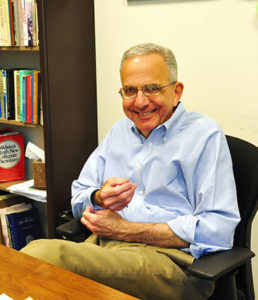Simon P. Newman

Ronald Hoffman was the longest serving director of the Omohundro Institute.
Below are remembrance from colleagues. To share a remembrance of Ron, please contact Martha Howard (mxhowa@wm.edu).
From Simon P. Newman
I have many memories of Ron Hoffman, and there are many things I could write about. I shall always be grateful to him for having the courage to entrust the annual OI conference to myself and my colleagues at the University of Glasgow. It was the first time the OI met outside of North America, and Ron was willing to take the leap if we could ensure the conference was as affordable as possible: he thought it vital that graduate students and younger scholars be able to attend. I remember Ron coming to many of our annual BGEAH conferences in Britain, and the time he spent there with graduate students and young academics.
But most of all I shall always be grateful to Ron for the ways in which he encouraged my own scholarship. His decision to mark the bicentennial of the abolition of the legal transatlantic slave trade with a conference in Africa, and one that included as many African, Caribbean and Latin American scholars as possible, was a landmark event. For somebody like me, tentatively taking my first steps into that field, it was transformative. Sitting on a bus next to a graduate student from Legon describing his research into the songs and stories of resistance to slave traders in Ghana’s interior was remarkable, and I learned a huge amount about innovative scholarship often accomplished with few resources.
Somehow Ron not only survived the conference (on, as far as I can remember, a diet of coffee, French fries and beer), but he was encouraged to organise more, first a workshop for younger scholars again in Ghana, and then a conference at the University of the West Indies in Barbados. These meetings may not have been world-changing for scholars who have worked on the slave trade and slavery, but I firmly believe that Ron’s commitment to slavery studies in a comparative, Atlantic World context helped move the subject to the front and center of ‘Vast Early America.’
Our field is so much richer because of Ron and his team, most especially Sally and Beverly. Thank you, Ron: we shall miss you.
—Simon P. Newman
University of Glasgow
